‘Serious and imminent’ risk of genocide in Ukraine – report
There is enough evidence to conclude that Russia is inciting genocide in Ukraine and committing atrocities intended to destroy the Ukrainian people, according to the first independent report into allegations of genocide committed by Russian troops in Ukraine.
More than 30 leading legal scholars and genocide experts have signed the report accusing the Russian state of violating several articles of the United Nations Genocide Convention, CNN reports.
The report warns there is a serious and imminent risk of genocide in Ukraine, accompanied by a long list of evidence including examples of mass killings of civilians, forced deportations and dehumanising anti-Ukrainian rhetoric used by top Russian officials.
It directly accuses Russian top officials of orchestrating incitement to genocide and laying the groundwork for future genocide by repeatedly denying the existence of a Ukrainian identity.
As examples, the report points to the dehumanising language used by Russian officials to describe Ukrainians, including words such as “bestial”, “subordinate” and “filth”, or Vladimir Putin’s statements that he believes Ukraine has no right to exist as an independent state.
Azeem Ibrahim, a director at the US-based thinktank New Lines Institute for Strategy and Policy, which put together the report, said:
What we have seen so far is that this war is genocidal in its nature, in terms of the language being used and the manner in which it is being executed. That’s very, very clear.
The experts also accused Russian forces of carrying out a “pattern of consistent and pervasive atrocities against Ukrainian civilians collectively” in the course of the invasion.
It said that well-documented massacres and summary executions in Bucha, Staryi Bykiv, and in Sumy and Chernihiv regions, Russia’s deliberate attacks on shelters, evacuation routes and healthcare facilities, as well the indiscriminate targeting and bombardment of residential areas, rapes, sieges, grain thefts and forced deportations to Russia all amount to “genocidal pattern of destruction”.
The report calls on the international community to act, warning that there is “no time at all”. Ibrahim said:
Every country that is a signatory to the Genocide convention, and that’s 151 countries including the Russian Federation, every country has to do whatever it can to put a stop to this, otherwise they will also be in breach of the convention.
Russian-backed forces have captured the eastern city of Lyman in Ukraine’s Donetsk region, officials from both sides have now appeared to confirm.
Earlier today, Russian media reported that pro-Russian separatists had seized Lyman, a major railway hub in the Donetsk region which has long been a target of pro-Russian forces.
An adviser to the Ukrainian president’s chief of staff, Oleksei Arestovych, said the attack on the city showed that “the Russian army has improved its tactical skills and operational management”.
His comments came as the governor of the Donetsk region of Donbas, Pavlo Kyrylenko, told Ukrainian broadcaster Hromadske that Lyman was “mainly controlled by Russian troops” but the Ukrainian military had taken up new fortified positions in the area.
Located in the north of the eastern Donetsk region, Lyman sits on a road leading to key eastern cities still under Kyiv’s control.
The capture of Lyman marks the second midsize Ukrainian city to fall under Russian hands this week, following the capture of Svitlodarsk earlier this week.
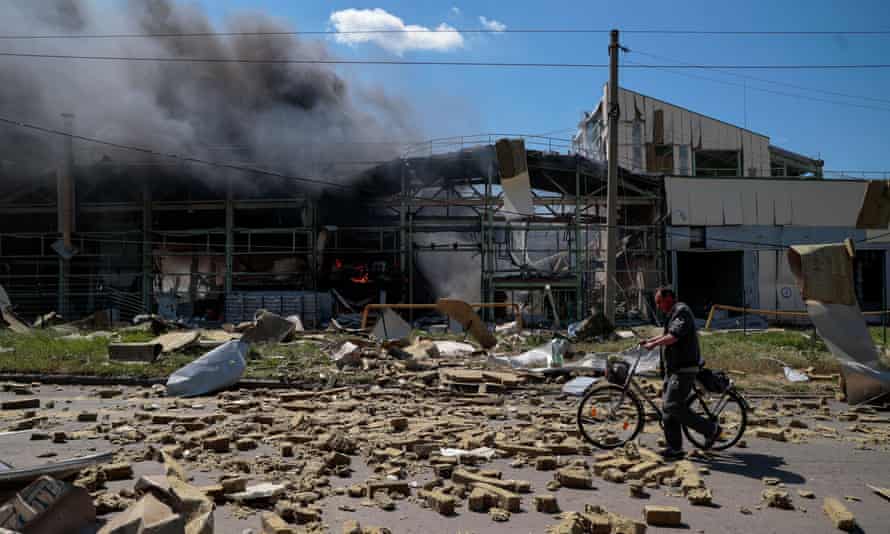
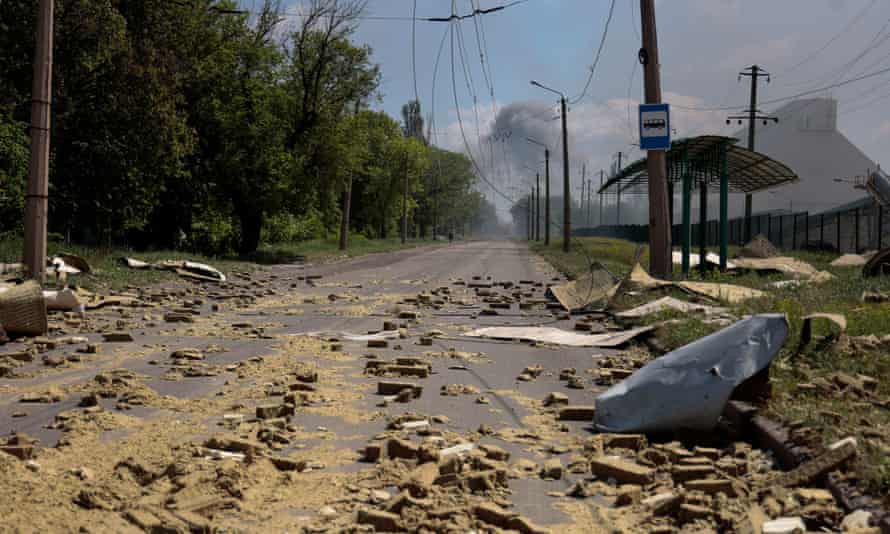
Talks between Turkish officials and delegations from Sweden and Finland have made little progress in overcoming Ankara’s opposition to the Nordic countries’ Nato membership bids, according to sources.
A senior Turkish official told Reuters that it was “not an easy process”, and that it was not clear when further discussions will take place.
The source said:
They need to take concrete steps that will be difficult. Further negotiations will continue. But a date doesn’t seem very close.
Another source said the talks, which took place in the Turkish capital on Wednesday, made no clear progress and ended with no timeline to continue.
The five-hour discussions were cordial and included separate sessions between Turkish officials and counterparts from Finland and Sweden, followed by three-way talks with all parties, the second source added.
A third source said Turkish officials had downplayed the prospect of reaching an agreement before the Nato summit at the end of June in Madrid.
‘Serious and imminent’ risk of genocide in Ukraine – report
There is enough evidence to conclude that Russia is inciting genocide in Ukraine and committing atrocities intended to destroy the Ukrainian people, according to the first independent report into allegations of genocide committed by Russian troops in Ukraine.
More than 30 leading legal scholars and genocide experts have signed the report accusing the Russian state of violating several articles of the United Nations Genocide Convention, CNN reports.
The report warns there is a serious and imminent risk of genocide in Ukraine, accompanied by a long list of evidence including examples of mass killings of civilians, forced deportations and dehumanising anti-Ukrainian rhetoric used by top Russian officials.
It directly accuses Russian top officials of orchestrating incitement to genocide and laying the groundwork for future genocide by repeatedly denying the existence of a Ukrainian identity.
As examples, the report points to the dehumanising language used by Russian officials to describe Ukrainians, including words such as “bestial”, “subordinate” and “filth”, or Vladimir Putin’s statements that he believes Ukraine has no right to exist as an independent state.
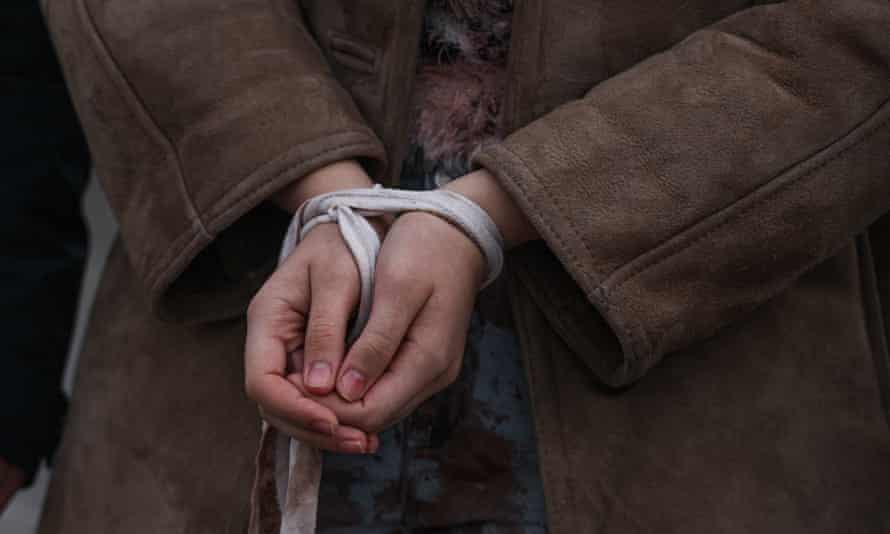
Azeem Ibrahim, a director at the US-based thinktank New Lines Institute for Strategy and Policy, which put together the report, said:
What we have seen so far is that this war is genocidal in its nature, in terms of the language being used and the manner in which it is being executed. That’s very, very clear.
The experts also accused Russian forces of carrying out a “pattern of consistent and pervasive atrocities against Ukrainian civilians collectively” in the course of the invasion.
It said that well-documented massacres and summary executions in Bucha, Staryi Bykiv, and in Sumy and Chernihiv regions, Russia’s deliberate attacks on shelters, evacuation routes and healthcare facilities, as well the indiscriminate targeting and bombardment of residential areas, rapes, sieges, grain thefts and forced deportations to Russia all amount to “genocidal pattern of destruction”.
The report calls on the international community to act, warning that there is “no time at all”. Ibrahim said:
Every country that is a signatory to the Genocide convention, and that’s 151 countries including the Russian Federation, every country has to do whatever it can to put a stop to this, otherwise they will also be in breach of the convention.
Art critic Charlotte Mullins writes about 2,000 stolen artworks attest to Vladimir Putin’s desre to erase a nation’s history – like so many despots before him:
As Russia’s invasion of Ukraine began, the director of the Museum of Local History in Melitopol in the south-east of the country, Leila Ibrahimova, arranged for a hoard of gold artefacts from ancient Scythia to be hidden. Just a few weeks later, she was kidnapped and interrogated by Russian troops. They demanded to know where the Scythian gold was; she refused to cooperate.
Subsequently the museum’s curator Galina Andriivna Kucher was taken at gunpoint to the museum and asked to show a Russian “expert” and agents where the gold was. She also refused to locate the collection. Kucher was later abducted from her home on 30 April and her whereabouts remains unknown.
According to a report on the theft in the New York Times, Russian troops eventually found the gold hoard, which dates back to the fourth century BC, boxed up in the museum’s basement.
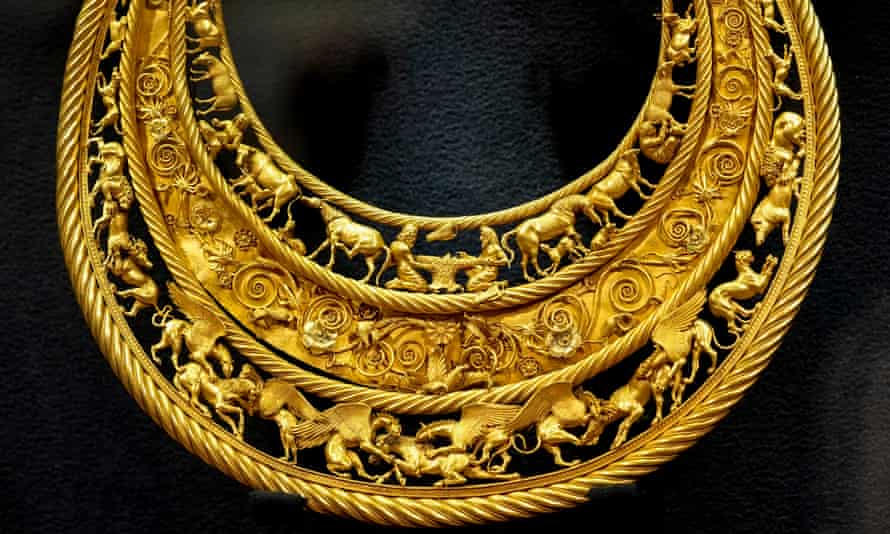
The items were taken to Donetsk, in the Russian-controlled Donbas region, for “safety”, with the museum’s newly installed puppet director, Evgeny Gorlachev, stating that the gold artefacts were not just for Ukrainians but “of great cultural value for the entire former Soviet Union”. His carefully chosen words were designed to erase the collection’s Ukrainian heritage and replace it with a Soviet one, one that suggested Ukraine was back within Russia’s sphere of influence and control.
To date, Russian forces have caused the destruction or severe damage of 250 museums and institutions in Ukraine. Twenty-five paintings by Ukrainian folk artist Maria Prymachenko were incinerated after the Museum of Local History in Ivankiv was hit by a missile. The Arkhip Kuindzhi museum in the besieged city of Mariupol was badly damaged by an airstrike that left paintings exposed to the elements, hanging on walls amid piles of rubble. The Cultural Heritage Monitoring Lab, run by the Virginia Museum of Natural History in association with the Smithsonian, has already logged more than 110 memorials destroyed by Russian weapons.
But as well as destroying museums and galleries, Russian troops are accused of having stolen an estimated 2,000 artworks. In addition to the theft of the Scythian gold in Melitopol, in Mariupol a handwritten Torah scroll and a valuable gospel printed in Venice in 1811 were all have been taken.
Ten people were killed and at least 35 wounded after Russian missile strikes hit the Dnipropetrovsk region in central-eastern Ukraine this morning, according to reports.
Russian forces launched three missiles from the Rostov region of Russia, with one missile hitting a Ukrainian national guard base in Dnipro, Ukrinform reports.
Regional governor Valentyn Reznichenko earlier said rescuers were working in rubble to look for possible survivors in the aftermath of “an unquiet night and an unquiet morning”.
More recently, the head of the Dnipro territorial defence, Hennadiy Korban, said on local TV:
There was a tragedy in the morning. An Iskander missile struck a National Guard firing range.
Unfortunately, about ten people were killed. About 30-35 people were injured. Most of the personnel were scattered throughout the region.
He added that the situation was getting worse not only in the region, but also at the front. Russian troops have been intensifying their offensive primarily in the Luhansk and Donetsk regions, and the Dnipropetrovsk region is surrounded by three fronts.
Turkey expects Sweden and Finland to stop what it says is their “support given to terrorism” in order for Ankara to lift its opposition to them joining Nato, the Turkish foreign minister, Mevlüt Çavuşoğlu, said.
The two Nordic countries formally applied to join the military alliance last week, and all 30 Nato member states must give their approval in order for them to be admitted.
However, Turkey has challenged their Nato bids and claimed they harbour people linked to the Kurdistan Workers Party (PKK) militant group and followers of Fethullah Gulen, whom Ankara accuses of orchestrating a 2016 coup attempt.
Çavuşoğlu told reporters at a news conference, quoted by Reuters:
A concrete step needs to be taken regarding Turkey’s concerns. They have to cut the support given to terrorism.
Finnish and Swedish delegations visited the Turkish capital for talks with Turkish officials on Wednesday. After the meetings, a spokesperson for Turkey’s president, Recep Tayyip Erdoğan, said Ankara had observed a positive attitude on lifting an arms exports embargo.
Moscow and Kyiv blame each other for frozen peace talks
The Kremlin has blamed Kyiv for the stalling of peace talks between Russia and Ukraine, claiming that Ukraine’s president, Volodymyr Zelenskiy, “constantly makes contradictory statements”.
In his daily briefing with reporters, Kremlin spokesperson Dmitry Peskov said:
The Ukrainian leadership constantly makes contradictory statements. This does not allow us to fully understand what the Ukrainian side wants.
Earlier today, Zelenskiy said he had tried repeatedly to organise a meeting with his Russian counterpart, Vladimir Putin, to end the war, but that Moscow did not appear to be ready yet for serious talks.
Zelenskiy said:
There are things to discuss with the Russian leader. I’m not telling you that … our people are eager (for me) to talk to him, but we have to face the realities of what we are living through.
What do we want from this meeting? … We want our lives back… We want to reclaim the life of a sovereign country within its own territory.
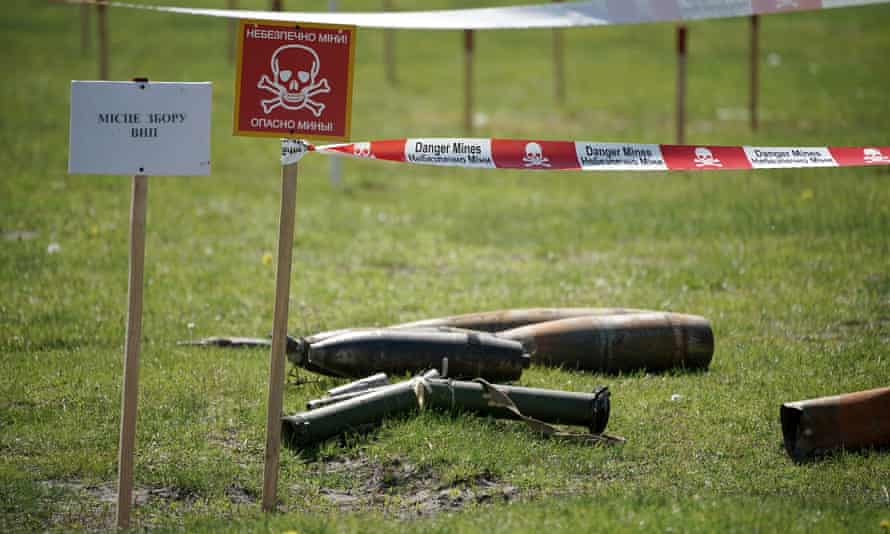
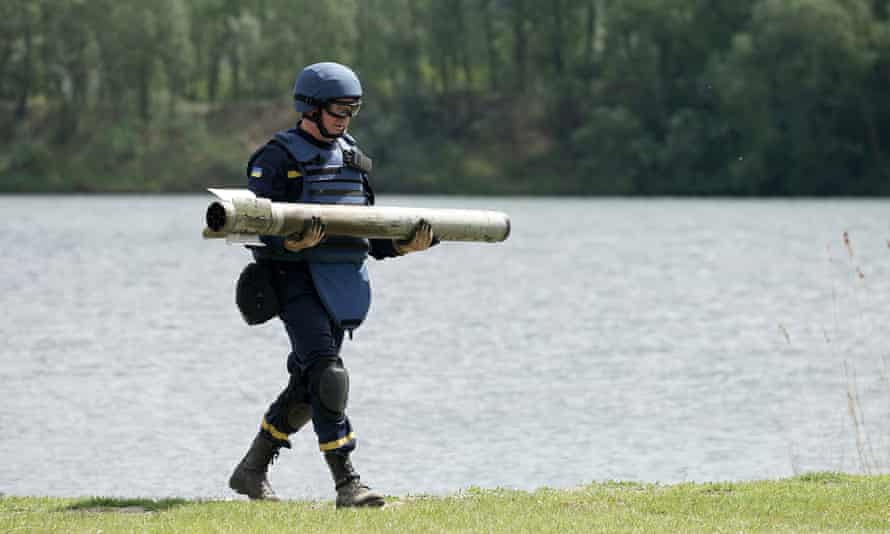
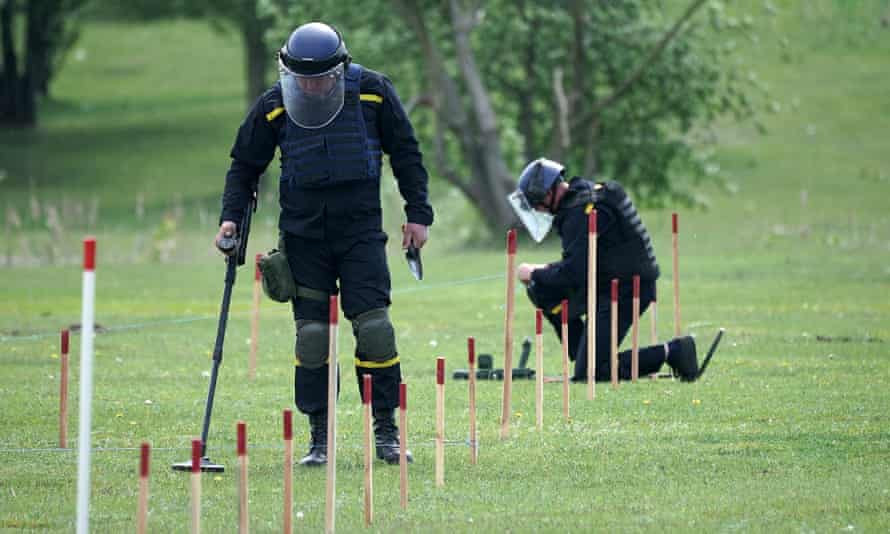
Moscow says west has declared ‘total war’ on Russia
Russia’s foreign minister, Sergei Lavrov, has accused western countries of waging a “total war” on Russia and its people and culture.
Western allies are “cancelling Russia and everything connected” with it including banning Russian writers, composers and other cultural figures, he said at a ministry meeting.
Lavrov said:
The west has declared war on us, on the whole Russian world. The culture of cancelling Russia and everything connected with our country is already reaching the point of absurdity.
It was “safe to say” that the situation “will be with us for a long time”, he said.
He said the US “and its satellites are doubling, tripling, quadrupling their efforts to contain our country”, by using “the widest range of tools – from unilateral economic sanctions to thoroughly false propaganda in the global media space”.
He added:
In many western countries, everyday Russophobia has become of an unprecedented nature, and, to our great regret, is encouraged by government circles in a number of countries.
Hello everyone. It’s Léonie Chao-Fong here again, taking over the live blog from Martin Belam to bring you all the latest developments on the war in Ukraine. Feel free to get in touch on Twitter or via email.
Russia making ‘slow but palpable’ progress in Ukraine, says UK

Andrew Sparrow
The UK’s prime minister, Boris Johnson, said Russia was making “slow but palpable” progress in Donbas.
In an interview with Bloomberg, extracts from which are being released over the course of the day, Johnson said:
I think it’s very, very important that we do not get lulled because of the incredible heroism of the Ukrainians in pushing the Russians back from the gates of Kyiv.
I’m afraid that Putin – at great cost to himself and Russian military – is continuing to chew through ground in Donbas, he’s continuing to make gradual, slow, but, I’m afraid, palpable progress. Therefore it is absolutely vital that we continue to support the Ukrainians militarily.
As Bloomberg reports, Johnson said he would like to see further military support going to Ukraine, including more multiple-launch rocket systems that would allow the Ukrainians to strike Russian targets from a greater distance.
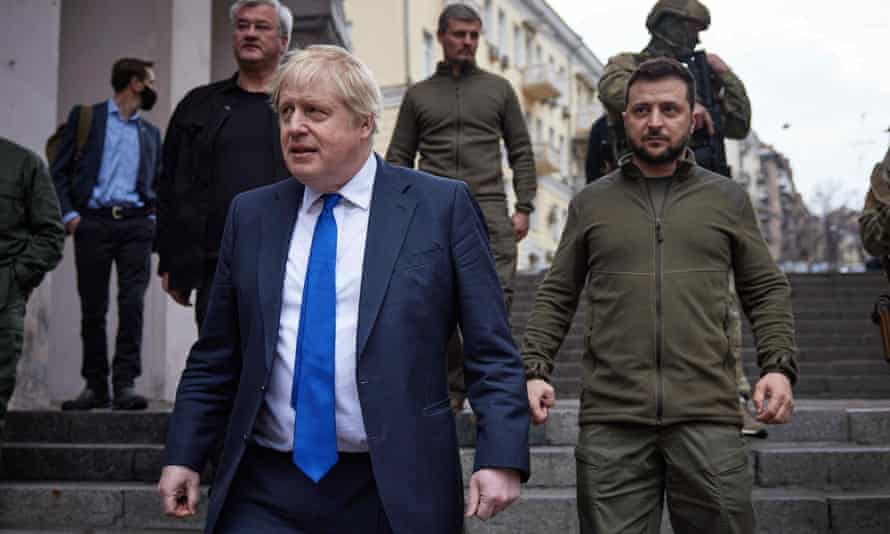
He also appeared to dismiss the prospect of negotiating with Vladimir Putin, saying the Russian president was not to be trusted. He said:
How can you deal with a crocodile when it’s in the middle of eating your left leg? The guy’s completely not to be trusted.
Today so far …
- Officials in Ukraine have admitted that Russia has the “upper hand” in fighting in the country’s east, as Ukrainian forces fell back from some of their positions in the Donbas region.
- The governor of Luhansk region, Serhiy Haidai, said just 5% of the region remained in Ukrainian hands – down from about 10% little more than a week ago – and that Ukrainian forces were retreating in some areas.
- Pro-Russian separatists from the self-proclaimed Donetsk People’s Republic have said they have established full control over the strategic town of Lyman in eastern Ukraine. The claims have not been independently verified.
- Russian ground forces are continuing their attempt to surround Sievierodonetsk and Lyschansk, having recently captured several villages north-west of Popasna, the UK ministry of defence has said in its latest report.
- Artillery pounded the north eastern city of Kharkiv yesterday for the first time in two weeks, just as life in Ukraine’s second city was starting to return to normal. Kharkiv’s regional governor, Oleh Synehubov, said at least nine people had been killed and 17 injured in the attacks on the northern part of the city. He said “doctors are providing all necessary assistance” and there were no further casualties overnight.
- Ukrainian president Volodymyr Zelenskiy has said Ukraine was not eager to talk to Russia’s Vladimir Putin, but that it has to face the reality that this will likely be necessary to end the war.
- Russia’s ministry of defence has claimed to have killed more than 250 fighters overnight, shot down one MiG-29 aircraft, and destroyed two ammunition dumps, including one within the self-proclaimed Donetsk People’s Republic.
- The Kremlin has rejected claims that Russia has blocked grain exports from Ukraine, blaming the west for creating such a situation by imposing sanctions on Russia. The UK’s foreign minister, Liz Truss, accused Vladimir Putin of “weaponising” hunger through Russia’s blockade of Ukrainian grain exports. A senior Turkish official said Ankara was in “ongoing” talks with Russia and Ukraine to open a corridor via the Bosphorus.
- Two captured Russian soldiers have pleaded guilty to shelling a town in eastern Ukraine, in the second war crimes trial since Russian troops invaded the country. Alexander Bobikin and Alexander Ivanov acknowledged being part of an artillery unit that fired at targets in the Kharkiv region from Russia’s Belgorod region.
- Russia has deployed mobile propaganda vans with large-screen televisions to humanitarian aid points in the captured city of Mariupol. The Orwellian turn comes as the Kremlin continued to push forward with efforts to integrate newly occupied territories across the south of Ukraine.
- Sweden and Finland’s push to join Nato won’t require adding more US ground forces into either country, the US general nominated to take over European Command told senators.
- The US is reportedly preparing to send advanced, long-range rocket systems to Ukraine after an urgent request from Ukrainian officials.
- Dmytro Kuleba, Ukraine’s foreign minister, said that “weapons, weapons and weapons again” are what the country needs. “We need more heavy weapons delivered as soon as possible, especially MLRS (multiple launch rocket systems) to repel Russian attacks,” Kuleba said.

